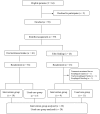A Walk-and-Eat Intervention Improves Outcomes for Patients With Esophageal Cancer Undergoing Neoadjuvant Chemoradiotherapy
- PMID: 26341759
- PMCID: PMC4591946
- DOI: 10.1634/theoncologist.2015-0178
A Walk-and-Eat Intervention Improves Outcomes for Patients With Esophageal Cancer Undergoing Neoadjuvant Chemoradiotherapy
Abstract
Background: Preserving functional walking capacity and nutritional status is important for patients with esophageal cancer, but no effective intervention is available, particularly during active treatment.
Methods: This pilot randomized controlled trial tested the effects of a walk-and-eat intervention for patients with esophageal cancer undergoing neoadjuvant chemoradiotherapy. Participants with locally advanced esophageal cancer stage IIB or higher (n = 59) were randomly assigned to receive the walk-and-eat intervention (n = 30; nurse-supervised walking three times per week and weekly nutritional advice) or usual care (n = 29; control group) during 4-5 weeks of chemoradiotherapy. Primary endpoints were changes in distance on the 6-minute walk test, hand-grip strength, lean muscle mass, and body weight between initiation and completion of intervention.
Results: Participants (mean age: 59.6 years) were mostly male (92.9%) with squamous cell carcinoma (96.4%). During chemoradiotherapy, participants who received the walk-and-eat intervention had 100-m less decline than controls in walk distance (adjusted p = .012), 3-kg less decrease in hand-grip strength (adjusted p = .002), and 2.7-kg less reduction in body weight (adjusted p < .001), regardless of age. The intervention group also had significantly lower rates of need for intravenous nutritional support and wheelchair use.
Conclusion: The nurse-led walk-and-eat intervention is feasible and effective to preserve functional walking capacity and nutritional status for patients with esophageal cancer undergoing neoadjuvant chemoradiotherapy.
摘要
背景. 保存功能性步行能力及营养状态对食道癌患者而言非常重要, 但目前尚无有效干预措施, 尤其是在积极治疗期间。
方法. 本项初步随机对照临床试验检验了步行-饮食干预对接受新辅助放化疗的食道癌患者的作用。在为期 4 ∼ 5 周的放化疗期间, 将高于或等于 IIB 期的局部晚期食道癌患者 (n = 59) 随机分配至步行-饮食干预组 (n = 30, 在护士指导下每周步行 3 次, 同时每周给予营养咨询建议) 或常规护理 (n = 29, 对照组)。主要终点为干预开始和结束时六分钟步行距离试验、手握力、肌肉量和体重的变化。
结果. 参与者 (平均年龄为 59.6 岁) 中多数为男性 (92.9%), 患有鳞状细胞癌 (96.4%)。在放化疗期间, 接受步行-饮食干预的受试者步行距离的降幅比对照组少 100 m (校正后P = 0.012), 握力降幅比对照组少 3 kg (校正后P = 0.002), 体重降幅比对照组少 2.7 kg (校正后P < 0.001), 且不受年龄影响。干预组需要静脉营养支持和使用轮椅的频率显著低于对照组。
结论. 对于接受新辅助放化疗的食道癌患者, 在护士指导下接受步行-饮食干预具有可行性, 并且能有效保存功能性步行能力和营养状态。The Oncologist 2015;20:1216–1222
对临床实践的提示: 对食道癌患者而言, 新辅助放化疗常伴有影响食欲和体重的副作用, 并且可导致体力活动明显下降, 继而削弱力量、肌肉量和功能性步行能力。本研究提示参加步行-饮食干预可能减少食道癌患者中的这些副作用。如医生和护理领导能合作促进患者遵循干预方案, 那么护士可以在肿瘤放疗科实施这些干预。
Keywords: Esophageal cancer; Exercise; Neoadjuvant therapy; Nutrition; Randomized controlled trial.
©AlphaMed Press.
Conflict of interest statement
Disclosures of potential conflicts of interest may be found at the end of this article.
Similar articles
-
Nutritional support with endoluminal stenting during neoadjuvant therapy for esophageal malignancy.Ann Surg Oncol. 2009 Nov;16(11):3161-8. doi: 10.1245/s10434-009-0630-2. Epub 2009 Jul 28. Ann Surg Oncol. 2009. PMID: 19636630
-
Self-expanding plastic esophageal stents versus jejunostomy tubes for the maintenance of nutrition during neoadjuvant chemoradiation therapy in patients with esophageal cancer: a retrospective study.Dis Esophagus. 2009;22(3):216-22. doi: 10.1111/j.1442-2050.2008.00905.x. Epub 2008 Dec 22. Dis Esophagus. 2009. PMID: 19207544
-
Neoadjuvant chemoradiotherapy for esophageal carcinoma.Dis Esophagus. 2005;18(2):104-8. doi: 10.1111/j.1442-2050.2005.00461.x. Dis Esophagus. 2005. PMID: 16053485
-
Trimodality therapy and definitive chemoradiotherapy for esophageal cancer: a single-center experience and review of the literature.Dis Esophagus. 2015 Oct;28(7):612-8. doi: 10.1111/dote.12242. Epub 2014 May 27. Dis Esophagus. 2015. PMID: 24863560 Review.
-
Treatment strategies for esophageal cancer.Gastroenterol Clin North Am. 2013 Mar;42(1):187-97. doi: 10.1016/j.gtc.2012.11.007. Gastroenterol Clin North Am. 2013. PMID: 23452638 Review.
Cited by
-
QOLEC2: a randomized controlled trial on nutritional and respiratory counseling after esophagectomy for cancer.Support Care Cancer. 2021 Feb;29(2):1025-1033. doi: 10.1007/s00520-020-05573-z. Epub 2020 Jun 22. Support Care Cancer. 2021. PMID: 32572611 Free PMC article. Clinical Trial.
-
Machine learning model for predicting excessive muscle loss during neoadjuvant chemoradiotherapy in oesophageal cancer.J Cachexia Sarcopenia Muscle. 2021 Oct;12(5):1144-1152. doi: 10.1002/jcsm.12747. Epub 2021 Jun 17. J Cachexia Sarcopenia Muscle. 2021. PMID: 34145771 Free PMC article.
-
The Effect of Exercise and Nutritional Interventions on Body Composition in Patients with Advanced or Metastatic Cancer: A Systematic Review.Nutrients. 2022 May 18;14(10):2110. doi: 10.3390/nu14102110. Nutrients. 2022. PMID: 35631251 Free PMC article.
-
Attrition after Neoadjuvant Chemotherapy in Foregut Cancer: Experience at a Tertiary Center in the Deep South.Ann Surg Oncol. 2025 Jul 17. doi: 10.1245/s10434-025-17795-8. Online ahead of print. Ann Surg Oncol. 2025. PMID: 40676421
-
Effects of Exercise on Chemotherapy Completion and Hospitalization Rates: The OptiTrain Breast Cancer Trial.Oncologist. 2020 Jan;25(1):23-32. doi: 10.1634/theoncologist.2019-0262. Epub 2019 Aug 7. Oncologist. 2020. PMID: 31391297 Free PMC article.
References
-
- Pennathur A, Gibson MK, Jobe BA, et al. Oesophageal carcinoma. Lancet. 2013;381:400–412. - PubMed
-
- Lambert R, Hainaut P. The multidisciplinary management of gastrointestinal cancer. Epidemiology of oesophagogastric cancer. Best Pract Res Clin Gastroenterol. 2007;21:921–945. - PubMed
-
- Enzinger PC, Mayer RJ. Esophageal cancer. N Engl J Med. 2003;349:2241–2252. - PubMed
-
- Sjoquist KM, Burmeister BH, Smithers BM, et al. Survival after neoadjuvant chemotherapy or chemoradiotherapy for resectable oesophageal carcinoma: An updated meta-analysis. Lancet Oncol. 2011;12:681–692. - PubMed
-
- Gebski V, Burmeister B, Smithers BM, et al. Survival benefits from neoadjuvant chemoradiotherapy or chemotherapy in oesophageal carcinoma: A meta-analysis. Lancet Oncol. 2007;8:226–234. - PubMed
Publication types
MeSH terms
LinkOut - more resources
Full Text Sources
Other Literature Sources
Medical


